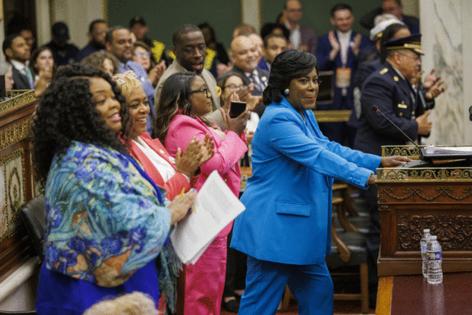Mayor Cherelle Parker and Philly Council reach $6.8 billion deal for the next city budget
Published in News & Features
After two days of nearly around-the-clock negotiations, Philadelphia City Council members on Thursday afternoon gave preliminary approval to a $6.8 billion city budget and almost all of the legislative proposals related to Mayor Cherelle L. Parker’s signature housing plan.
In the end, lawmakers green-lit wage and business tax cuts proposed by Parker in March as well as the mayor’s request for $800 million in borrowing authority to support her Housing Opportunities Made Easy, or H.O.M.E., initiative, which aims to create or preserve 30,000 housing units.
“At a time of real uncertainty in our country, this budget makes substantial, bold investments in the programs we need most to make Philadelphia the safest, cleanest and greenest big city in America,” Parker said in a statement.
Council President Kenyatta Johnson had hoped to advance the legislation Wednesday, but he and Parker’s team reached an impasse in negotiations over Council’s role in overseeing how the bond money got spent.
He sent lawmakers home at 1 a.m. Thursday morning after lengthy closed-door negotiations, called them back hours later for a full day of meetings, and had to employ procedural tricks to ensure the major proposals stayed on track to pass before the start of the next fiscal year July 1.
The final sticking point was a provision Council added to the H.O.M.E. bond authorization that gave lawmakers additional oversight on how the money is spent.
Once that issue was resolved with a compromise version of the oversight language, it became clear that Parker largely got what she wanted from her second budget since she took office last year.
Johnson, who also assumed his office last year, stressed that he and Parker worked together on the budget.
“We’re working in partnership with the administration on the H.O.M.E. program,” he told reporters Thursday. “It’s a great accomplishment today in terms of how we’re going to address the housing crisis here in the city of Philadelphia.”
Many expected Johnson to insist Parker accept more aggressive cuts to the business income and receipts tax. But he said Thursday that Parker’s plan — which involves modest cuts at first, but an unusual 13-year schedule of reductions that will take effect without additional action from future Councils — was “a step in the right direction.”
“The tax cuts that we have put forward, working in partnership with the mayor, are codified,” he said, “so it definitely signals that the city of Philadelphia is open for business.”
Council oversight at issue
The negotiation logjam broke Thursday afternoon when the Finance Committee approved an amendment to the housing bond authorization bill that included a compromise version of a provision ensuring Council’s oversight of bond spending.
Council had initially proposed the creation of a project review team — consisting of two legislative appointees and one administration appointee — that would review any changes to how Parker’s administration plans to distribute the bond proceeds in the coming year.
After the amendments, the project review team will have two mayoral appointees and two Council appointees who will deliberate on any changes to annual H.O.M.E. funding that come to less than 10% of the spend. If an alteration to the H.O.M.E bond’s annual budget spend affects more than 10%, Council would have to approve the change with legislation.
Council will also be apprised of how each Council district will be affected by H.O.M.E-related spending on a quarterly basis.
Parker’s team notched a big win when it got Council to include language that will allow 1,000 parcels of city-owned land to be fast-tracked for development. That means legislation will not be needed to approve the sale of these properties — a requirement that slows down the disposition of land and sometimes removes tracts from consideration entirely.
Rapid-fire votes
The three committees that advanced the legislation Thursday did so with rapid-fire voice votes, making it difficult to hear if any individual members voted against the bills. Council will take a final roll-call vote on all the proposals at its next meeting, putting all members on record.
On Thursday, Councilmember Kendra Brooks said she was voting against all tax and budget legislation this year. Brooks does not sit on the committee that approved the H.O.M.E. bond authorization.
She issued a joint statement with fellow Working Families Party Councilmember Nicolas O’Rourke, who was absent Thursday, saying the closed-door negotiations “led to a budget that fails to address critical needs in our communities and ignores the dire consequences of federal cuts,” pointing to a lack of new funding for reproductive health care, mobile mental health crisis teams, and other issues.
Councilmembers Jamie Gauthier and Rue Landau, progressive Democrats often aligned with Brooks and O’Rourke, applauded the passage of the housing plan and, surprisingly, voted in favor of the wage and business tax cuts.
“As leaders of City Council’s Housing Committee, we look forward to working with Council President Johnson, Mayor Parker, and our colleagues to build and preserve safe, stable, and affordable housing — especially for those most burdened by this crisis," they said in a joint statement.
_____
(Staff writer Fallon Roth contributed to this article.)
_____
©2025 The Philadelphia Inquirer. Visit inquirer.com. Distributed by Tribune Content Agency, LLC.







Comments